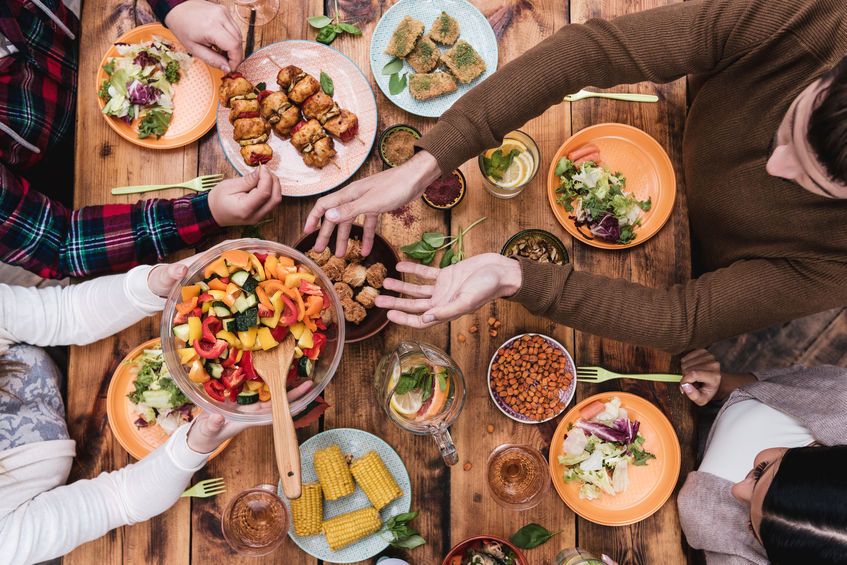6 Categories of "Always Do"
Table Manners

As opposed to the things we never do while sharing a meal with others, there are things we should always do.
Using the following “Always Do” examples as a checklist will make you a delightful dinner guest, dining partner, and one who leads by example.
Perfect Punctuality
- Have a heart for your host. This is the person who went to the trouble to organize the party you’re attending and then worries if a diner will show up, has the inconvenience of holding off on calling people to the table when someone is late, or has to adjust or rearrange the evening’s time frame.
- Whether for a host or a fellow guest, your arriving on time is important for providing a positive dining experience for everyone.
Promptness is the first element to consider in making and leaving a positive impression.
A Smile Shows It!
- It’s impossible to wear a smile and not affect others or yourself positively.
- Your smile is evidence of your positive attitude – one of the most important qualities to have when spending time with other people.
- Smiling affects your own body as a stress reliever, mood improver, blood pressure adjuster, immune booster. It’s only natural that others will be drawn to you when you smile.
Smiles are peaceful and relaxing to others. It’s no wonder that laughter also has a place at the table.
Contribute to Winning Table Conversations
- It’s a great idea ahead of time to write down ten possible conversation starter questions. No one will know you aren’t a natural born conversationalist.
- Say positive things about the food and be generous with “Thank you” and “Please.”
- If asked if you like (or don’t like) the food, simply say, “I am enjoying my food! Thank you for asking,” or “Thank you! Everything is lovely!”
- When you leave the table, pick up on someone’s departing comments and compliment the statement. Or offer a final reflection of the good time you had.
- Even if a gathering is for a somber event, being as convivial as possible according to the occasion, will be experienced as a relief and peace of mind.
- Listening well is helpful to not only the table conversation but your own mindfulness of the food and why you are there.
Sharing and caring thoughts are general guidelines for good conversation.
Offer Little Gestures of Respect
- The gift you bring for your host is an expression of gratitude for being invited. It won’t be a topic of conversation.
- When food has been passed to you, continue to pass the food to the person next to you after serving yourself.
- If a person has spinach on her teeth, silently get her attention and gesture quietly.
- When someone has something to say, find a positive response or respectful question to ask about it.
- If another person makes a faux pas, let it slide by unnoticed.
- If you need to leave the table, do so between courses, first saying, “Excuse me.”
- If you finish your meal first, wait until the host signals that the meal has ended before loosely folding and placing your napkin on the table.
Etiquette is the physical means of showing respect for others. And we know that it’s the little things that count.
Follow the Leadership of Your Host at All Times
- Your host will welcome you and let you know where and when to sit.
- The host will welcome the group and will place his napkin on his lap to signal the beginning of the meal.
- If the host notes a time constraint, model your order at a restaurant similar to his.
- If a toast is offered, participate. It’s okay to follow suit if you have a toast to make later in the meal. Toasting the host is appropriate.
- When the meal is over the host will place her napkin on the table. Everyone else at the table should do the same as quickly as possible. (It’s true: you may have to leave food unfinished. No doggie bags/boxes, please.)
Hosts carry a lot of responsibility. They are the leaders of the event.
Wrap It Up with Gratitude
- Thank your host for the wonderful occasion and let her know she’s appreciated.
- A written thank-you note will reinforce your gratitude.
Beneficence or generosity is a main pillar of society. To paraphrase Adam Smith, 19th century moral philosopher, when someone chooses to do something good for you, this calls for a reward—perhaps a gesture of appreciation—because of the gratitude you feel.
Remembering what you should always do when sharing a meal with other people is easy when summarized. The bottom line is that you remain positive, kind, and grateful. The magic of possessing these qualities is that you find yourself surrounded by positive, kind, and grateful people!














